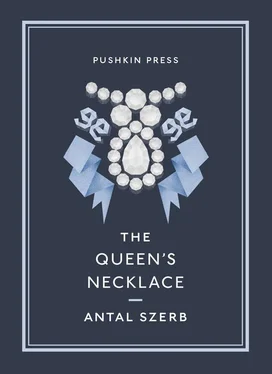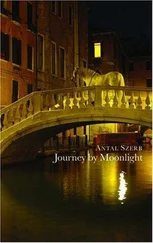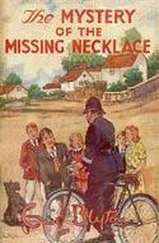“So the Turks, or the Tartars, really are within the gates?”
“Not at all; what I said was that men will be governed by philosophy and reason alone.”
“Wonderful,” said La Harpe. “And have you no prophesy for me?”
“You will be the greatest miracle of all. You will become a Christian.”
“Well, then,” laughed Chamfort, “no harm there. So long as we don’t perish before La Harpe becomes a Christian, we shall all live for ever.”
The Duchesse de Grammont spoke next:
“It’s lucky we women won’t be part of the revolution. Or rather, I think, we might get involved to some extent, but no one will harm us because of our sex …”
“Your sex, ladies, will not protect you, and it will make no difference whether you involve yourselves or not. They’ll deal with you the same as they do with the men. No distinction will be made.”
Cazotte was warming to his theme. His words swelled up in waves, like the bars of the scaffold, every one a ghastly prophesy.
“So you see,” said the Duchesse de Grammont with a smile, “you won’t even grant me the benefit of a confessor.”
“No, my lady, there will be no confessor, neither for you, nor for anyone else. The last condemned person to have that privilege …”
He stopped for a moment.
“Well, which happy mortal will have that privilege?”
“It will be his last: that person will be the King of France.”
The host instantly rose from the table, and everyone followed his example.
Chapter Nine. The Necklace Explodes
NOW PAY ATTENTION, Reader! “Dramatic scenes, in plenty,” promises Carlyle, “will follow of themselves, especially that fourth and final scene, spoken of above as by another author — by Destiny itself.”
We recall that Jeanne had told Rohan that the Queen wanted to have the necklace by Candlemas. On the following day, 2nd February 1785, Rohan dispatched a footman, accompanied by an Alsatian officer, to attend the King’s public breakfast and note what the Queen was wearing. It seems that Boehmer and Bassenge must also have sent someone, because the day after that they paid an anxious visit to Rohan to ask him what was the matter, that she had not been wearing it. Rohan reassured them, and told them they should rather write and thank the Queen for ridding them of their burdensome treasure. But by this stage the jewellers had irritated her so much that they did not dare go anywhere near her, and preferred to wait for a suitable opportunity. None came, and the months passed. The Queen had of course no idea that Rohan and Boehmer believed that the necklace was in her possession. Jeanne had reassured the interested parties that she would wear it only when she went to Paris. Another time she said it would be worn only when it was fully paid for. Then Rohan had a letter from ‘the Queen’, saying that he should go back to Saverne for a little while.
At the end of May Jeanne turned up at Saverne, in disguise and dressed as a man (for greater effect), to tell the Cardinal that on his return he would be granted an audience. Once again, Rohan could sleep soundly. “Oh unhappy man!” Carlyle shouts at him at this point. “This is not a world which was made in sleep; which it is safe to sleep and somnambulate in.” But Rohan did not wake.
July. The first payment was due on 1st August. Now growing anxious, Rohan asked Jeanne why the Queen was still not wearing the necklace. Because, Jeanne replied, she thought it too expensive. Unless the jewellers dropped their price by 200,000 livres she was going to return it. Boehmer and Bassenge pulled a face, but agreed the discount. This ‘real-world’ business operation reassured Rohan once again: he felt his feet once more on terra firma. All the same, the jewellers used the occasion, at Rohan’s prompting, to write that letter of thanks, which the Cardinal himself polished up into a little masterpiece of decorum.
On 12th July Boehmer went to Paris to give the Queen some jewels she had ordered for the christening of the Duc d’Angoulême, the son of the Comte d’Artois. This was the opportunity he had been waiting for. He handed her the letter, but as fate would have it, at just that moment in came the Finance Minister, Calonne, the most important man at Court. Boehmer made his exit, bowing deeply all the way, to give her time to read the letter and ask for an explanation.
Some while later she did read it, then gave it to Mme Campan to decode, since she was a clever woman and good at solving mysteries. But Mme Campan could make neither head nor tail of a single word. So the Queen burned the letter over a candle, and told Mme Campan that if ever the lunatic returned she should throw him out.
Thus fate spins its web. Since Marie-Antoinette had accepted the letter and said nothing more about it, the jewellers were convinced she did know about the necklace, and nothing would ever drive this notion out of their heads. Unwittingly, but none the less directly, Marie-Antoinette had become involved: she had contributed to deluding the victims.
We are now in the middle of July, and Jeanne is still her calmly superior self. Someone will eventually pay — after all, there are so many rich people in the world. For example that parvenu, the fabulously wealthy financier and Naval Treasurer Baudard de Sainte-James. Sainte-James was a close friend of the Cardinal, a devotee of Cagliostro, and a pillar of his lodge.
“The Queen is experiencing a short-term financial difficulty regarding the first payment,” she confided to Rohan. “Perhaps you should turn to Sainte-James—400,000 livres is nothing to him.”
The trouble was that others too were thinking of Sainte-James: Boehmer and Bassenge had also asked him to lend them the sum for which they were selling the diamond jewel. Sainte-James scratched his head: he was supposed to lend 400,000 livres so that Boehmer & Co could pay for what they already owned? What sort of business was that? But perhaps he should agree, for the sake of the Queen — he was just the sort of parvenu who doted on titles: it would delight him to do her a favour, in the hope of getting some little medal. So he asked Rohan to bring him a letter, written in the Queen’s own hand, asking him, by name, for the money. Rohan went back to Jeanne. But the letter never came.
According to the Abbé Georgel, this was because Réteaux de Villette was not in Paris at the time to forge one. Funck-Brentano prefers to think that Jeanne was unwilling to place a false document in Sainte-James’s hand. Aristocrats and Cardinals were one thing, but she could not assume the same credulity in a man of business. So this was not the answer.
Meanwhile time was passing, and now even she began to worry. After all, she too was human. In the inspiration of the very last moment she found a provisional solution: she pawned some of the remaining diamonds and gave the 30,000 livres they raised, together with an appropriate letter, to the Cardinal. Rohan passed the sum on to the jewellers, and asked, in the Queen’s name, if he could delay the payment of arrears until 1st October. But that was too much for the jewellers. Sainte-James had told them, they said, that they absolutely had to have the full amount that was due. Only now, it seems, did Jeanne, that glorious mayfly and mistress of the art of living from one day to the next, begin to realise just what danger she was in. Her husband, who had been pottering about in Bar without a care in the world, was summoned to Paris forthwith. And then a great new, and extremely bold, idea occurred to her.
On 3rd August she suddenly informed the jewellers: “You’ve been taken in. The documents in the Cardinal’s possession are forged. But don’t worry — he’s rich enough. He’ll pay.”
Читать дальше












